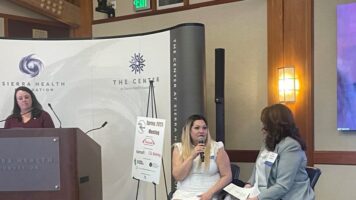Monthly Newsletter
CBF Celebrates Women’s History Month and Highlights the Importance of Vaccines
March 2025
California’s Life Science Industry Celebrates Women’s History Month
In recognition of Women’s History Month, CBF is celebrating these brilliant scientific minds and their contributions to the life science industry and the health of people worldwide. These individuals are disrupting norms, setting precedents, leading next generation treatments — and also happen to be women. From life-changing discoveries to groundbreaking technologies, these women have changed the course of history for the better and are making history as we speak.
Dr. Emmanuelle Charpentier and Dr. Jennifer Doudna made history as the first all-female team to win the Nobel Prize in Chemistry for developing the groundbreaking gene editing tool CRISPR. Their work led to revolutionary treatments for Sickle Cell, inherited blood disorders, and other genetic diseases and illnesses.
Dr. Grace E. Colón, is an InCardaTherapeutics advisor and former CEO where she brings over 25 years of experience in biopharma, genomics, healthcare, and industrial biotechnology.
Gertrude B. Elion is a biotech trailblazer and Nobel Prize-winning scientist whose breakthroughs led to life-saving treatments for leukemia, organ transplants, and viral infections.
Cynthia Kenyon is a pioneering molecular biologist whose research on aging transformed our understanding of longevity.
Reshma Kewalramani, M.D. is CEO and President of Vertex Pharmaceuticals. As a visionary leader in biotech, she’s driving medical innovation and inspiring future generations.
Angie You, Ph.D. is CEO of San Diego-based Architect Therapeutics. With a proven track record in life science leadership, she’s driving innovation in therapeutic advancements.
Nationwide Measles Outbreak Highlights the Life-Saving Importance of Vaccines
Measles is something most of us haven’t thought about in years, but suddenly, it’s making concerning headlines. As of March 13, 2025, the Centers for Disease Control and Prevention had reported 301 measles cases across 15 states which is more cases than reported during the entire year of 2024. The California Department of Public Health has reported 5 cases in 2025. Of all cases, 76% have been reported among children and young adults up to age 19.
Measles is a highly contagious virus that can cause serious illness, cognitive impairment, and death. Measles spreads easily through the air when an infected person breathes, talks, coughs, or sneezes. If an infected person coughs or sneezes, the virus can linger in indoor air for several hours.
Measles was officially eliminated from the United States in 2000. Elimination is defined as there being no measles spreading within the country and new cases are only found when someone contracts measles abroad and returns to the country. Achieving measles elimination status in the United States was a historic public health achievement.
According to Harvard Health, declining vaccination rates are the primary reason for the current measles outbreak. Only 2% of the recent cases in the U.S. involved people known to be fully vaccinated. The rest were either unvaccinated or had unknown vaccine status (95%), or they had received only one of the two vaccine doses (3%).
Vaccination is the safest most effective way to prevent measles and many other deadly diseases. They play a critical role in reducing the spread of, and, in some cases, eliminating the threat of the world’s many devastating infectious diseases. Vaccines are used to boost the body’s immune system and defend itself against diseases such as influenza, tetanus, diphtheria, mumps, measles, chicken pox, shingles, whooping cough, meningitis, smallpox and polio. Most of these infections can cause serious or life-threatening illnesses and may lead to life-long health problems or early death.
Due to life science advancements, vaccines can help protect us against more diseases than ever before. Some diseases that once injured or killed millions of people have been eliminated primarily due to vaccines. The World Health Organization estimates that immunization currently prevents 3.5-5 million deaths every year from diseases like diphtheria, tetanus, pertussis, influenza and measles and tens of millions of people are alive today because of the COVID-19 vaccines.
An example of vaccine efficacy includes the Measles, Mumps & Rubella (MMR) vaccine which is about 93% effective after one dose and 97% effective after two doses. The Centers for Disease Control and Prevention recommend that children receive the first dose at 12-15 months and the second dose at 4-6 years. Adults who are unsure of their vaccination status should consult their healthcare provider.
For more information about measles, the current outbreak, and vaccinations visit the California Department of Public Health or the Centers for Disease Control and Prevention.
Stay informed on the latest news and trends on the economic and health benefits of this industry by visiting CABiotech.org
If you have any questions about hosting informational briefings for your colleagues serving in the legislature, contact California Biotechnology Foundation Executive Director Patty Cooper at (916)764-2434 or [email protected].









